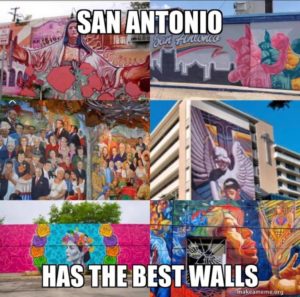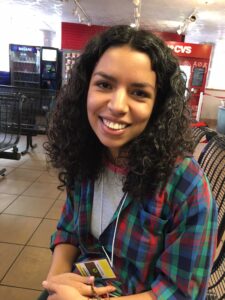
‘No, Mr. President – There Is Not A Wall in San Antonio’
When presenting his proposal for an agreement on wall funding last Saturday, President Trump spoke about the effectiveness of security walls and highlighted San Antonio as an example of an unsafe city that is now safe because they built a wall. San Antonio, the seventh largest city in the U.S., is one of the safest large cities in the country and they did not build a wall.
On June 22, 2017, by unanimous Council approval, San Antonio became an official Compassionate City,  one of more than 70 recognized around the world. Along with compassion education, encouraging participation across sectors and intentional policy-making that is compassionate, the resolution includes “recognizing, recording and celebrating acts of compassion among members of the San Antonio community.” The Charter for Compassion states, “The principle of compassion lies at the heart of all religious, ethical and spiritual traditions, calling us always to treat all others as we wish to be treated ourselves.”
one of more than 70 recognized around the world. Along with compassion education, encouraging participation across sectors and intentional policy-making that is compassionate, the resolution includes “recognizing, recording and celebrating acts of compassion among members of the San Antonio community.” The Charter for Compassion states, “The principle of compassion lies at the heart of all religious, ethical and spiritual traditions, calling us always to treat all others as we wish to be treated ourselves.”
I experienced firsthand what compassion looks like in San Antonio. During my 4-day stay I was introduced to the Interfaith Welcome Coalition (IWC). At the heart of IWC’s ministry is meeting the needs of at-risk immigrants. In 2014 when hundreds of unaccompanied children began arriving in San Antonio, filling youth shelters to capacity, the faith community decided something had to be done to help. Today IWC’s hundreds of volunteers serve women and men and their children, mainly from Central America, who are seeking asylum from violence.
One major component of IWC’s ministry is having volunteers each day at the San Antonio International Airport and the city’s Greyhound bus station to assist asylum-seeking families just released from the men and women’s Immigration and Customs Enforcement (ICE) family detention centers in nearby Karnes City and Dilley, Texas. When Sr. Sharon and I arrived on Sunday morning a bus had already come from Dilley with women and their children. At 12:15 p.m. another arrived from Brownsville with immigrants directly from the border. Most of the immigrants are from Guatemala, Honduras or El Salvador and are easily indentified because they usually have one simple sack with all of their belongings and a manila envelope they carry indicating their final destination and other information, all in English. They usually have no money. They have passed an initial interview at the detention center, the first of an often long road they hope will end in being granted asylum.
The final bus for the day arrived at 2:15 p.m. from Karnes City. As soon as the passengers entered the station the team of Spanish-speaking volunteers, Sharon, Karen, Matt and Alex, like clock-work, moved into action welcoming them. The immigrants are taken to the ticket counter with a confirmation number for a ticket pre-paid by a family member or friend. Next they are given a sticker to wear indicating their departure time and the first destination stop. The volunteers then share with the immigrants the information they will need, writing their bus route, often six or seven transfers to their final destination sometimes several days away. The workers at the next stop are shown the paper which says, “Please show me where to take my next bus. Where should I wait? Thank you!” Each family is given a backpack with supplies for the trip – a blanket, a reusable water container, coloring book and stuffed animal for the children, diapers if needed, and a bag of snacks. They are also given a bag of food called loaves and fishes before leaving.

Alex: ‘It tears at my heartstrings’
One of the volunteers is always from the Refugee and Immigrant Center for Education and Legal Services (RAICES, meaning ‘roots’ in Spanish). Sunday it was Alex, a 25-year-old who comes regularly and is an executive assistant who hopes someday to be a social worker. A RAICES pro-bono lawyer has also helped prepare the immigrants for their interview at the detention center. Here Alex translates the paper work that is in English, collects information for research and provides a list of potential pro-bono legal help when the immigrants arrive at their destination where they are required to check in at the nearest ICE office within days of their arrival. I asked Alex what, as she listens to the immigrants, is hardest for her. She replied, “All of it tears at my heart strings. One thing that really hurts the most is that people want to follow the law and be an important member of society. But it’s entirely up to a judge who often decides arbitrarily whether to accept their asylum appeal.”
At Mass Sunday morning we prayed, “You who come to console all who are oppressed, Lord have mercy.” At the end of the day at the bus depot my heart was full of gratitude for the generosity of Alex and all of the volunteers for the welcome and consolation they provided to the women, men and children with whom they interacted. And I was deeply touched by the enduring Spirit of the immigrants who had already journeyed so long to reach San Antonio, often having experienced extremely difficult first days in the U.S. in oppressively cold rooms and sleeping on concrete floors. Their tender love for their children who accompany them in search of a safer life is abundantly evident.
San Antonio’s compassion on behalf of immigrants is a collaborative citywide effort. Two years ago at Christmas time, unannounced, ICE dropped 500 immigrants off at a church. IWC Volunteers were called and the city was immediately contacted. Human Services provided cots and food for everyone and the police and fire departments provided safety surrounding the church for the time it took to send the immigrants off to their destinations.
San Antonio, located 150 miles from the border, doesn’t have ‘a’ wall, Mr. President. Rather, it is a city of many walls that bespeak a different set of values; ones of compassion, welcome and a belief that we are one at the core of who we are as a human family.

